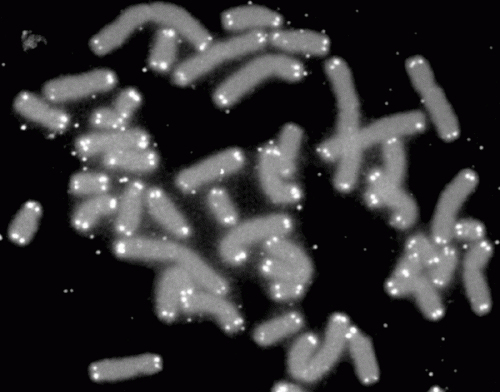Does stress cause premature DNA aging? Largest study to date investigates

Telomeres are "caps" on the ends of chromosomes that protect DNA from damage. As we age, telomeres gradually shorten, compromising their protective role. But individuals vary greatly in their telomere length, and telomeres may be a potent indicator of an individual's biological age. Short telomeres are associated with heart disease, metabolic syndrome, neural degeneration, and other chronic diseases.
We know telomere length is related to physical disease, but could it also be related to what's going on in our minds? Lab studies using mice have found that the stress hormone catecholamine damages chromosomes, so an increasingly popular idea is that stress could also shorten telomeres in humans. A definitive new meta-analysis on the topic, the largest analysis to date, used data from 22 earlier studies and over 8,700 participants to see if the hypothesis holds up. After statistically synthesizing the data, the researchers found a surprisingly small correlation between stress and telomere length (r = -0.06). The effect was similar for men and women.
The studies included in the meta-analysis typically measured participants' stress by asking questions about how they felt over the past month, using questions like, "In the last month, how often have you felt that you were unable to control the important things in your life?" It's possible that long-term stress could have more substantial effects. So far, there have been very few studies measuring stress repeatedly over years or decades, rather than months.
Because the new study used data from all previously published research on this topic, the data reflected a diverse range of demographics. Some studies mostly enrolled high-income, predominantly white subjects, others specifically recruited subjects facing major adversity (such as domestic abuse, or the need to care for an chronically ill child), and others contained subjects with physical conditions (such as mastocytosis, a serious immune disorder). It is possible that "stress" could be especially impactful for individuals facing chronic adversity. For these people, reporting stress in the short term might reflect a long-term battle, rather than a brief encounter with life's daily tribulations. So, the researchers investigated whether the relationship between stress and telomere length depended on these characteristics. The relationship was barely stronger in studies with highly stressed subjects (r = -0.10), and the difference was not statistically significant.
Ultimately, the new study calls into question the increasingly popular idea that stress damages telomeres. But the case is far from closed, and this study also raises many new questions, such as whether long-term stress might be more strongly related to shortened telomeres.
More information: Maya B. Mathur et al. Perceived stress and telomere length: A systematic review, meta-analysis, and methodologic considerations for advancing the field, Brain, Behavior, and Immunity (2016). DOI: 10.1016/j.bbi.2016.02.002

















